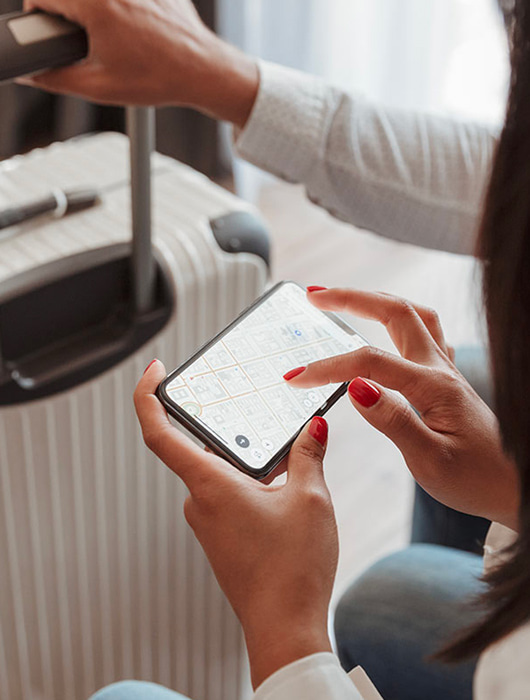REUTERS
By REUTERS
September 26, 2018

Gone are the days when people made their travel reservations by telephone or simply bought their tickets in person and checked into the nearest hotel. For some, planning their transportation, accommodations, and entertainment in advance is half the fun of going on vacation. Others prefer to leave those details in the more capable hands of companies like Fidelis Marketing Group, which not only markets eight luxury hotels at three exotic locations in Mexico but also has an in-house tour agency that plans trips to local attractions.
Regardless of whether you invest in a travel agent or prefer to plan your own trips, most travel arrangements – from Airbnb to luxury resorts – are now made online. But that’s not the only way that technology has changed the way we travel, according to Fidelis’ president, Mr. Kaloyan Valentinov Danchev. Today, we tend to take these changes for granted, seeing them as an inevitable part of living in a progressive world, but a century ago, they would’ve seemed completely bizarre
The Internet of Things (IoT)
Whether it’s done from a smartphone or a laptop, with or without the help of a travel agent, most travel arrangements are made online. It may be less personal than speaking to a real person, but the internet is reportedly the preferred way to make travel arrangements, according to a study by Google from July 2016 titled “How the Travel Research Process Plays Out in Time-to-Make-a-Plan Moments”. Unless a company is grossly out of touch with the times, email confirmations typically appear in your inbox within minutes of making your reservation or purchase, saving you the trouble of having to write down or memorize anything. Often, if it’s a ticket, you have the option of printing it immediately, having it mailed to you, or arranging to pick it up at will-call. Questions or no questions, this makes waiting on hold to speak to a representative seem more like a punishment than a public service.
Mobile Apps
Today, it only happens in your favorite ‘80s film. One of the cooler, more successful characters – usually shoulder-padded like a footballer and permed within an inch of their life – will produce an enormous device from their purse or briefcase. Your confusion and incredulity are followed by a snigger, as the character holds the gadget up to their face and starts what’s clearly supposed to be a phone conversation. Perhaps you pause and rewind the film so that you can share a laugh with your family members, friends, or housemates. Thank goodness that we’re no longer living in the Stone Age, you think. Nowadays, cell phones and mobile apps are small and powerful enough to be used for everything from making and confirming travel plans, checking in at the airport, streaming music and videos in-flight, researching restaurants and other venues, or trying to find your way back to your hotel from a crowded marketplace in Istanbul. Whether someone chooses to unlock their phone before traveling abroad or prefers to purchase an inexpensive alternative after their arrival, stats from CMO’s article “15 Mind-Blowing Stats About How Mobile Is Reshaping Travel” reveal that an overwhelming number of people consider their phone their single-most important travel accessory.
Virtual Reality and Beyond
New travel technologies are being invented, designed, crafted, produced, and tested every day. Whether or not they’ll make it into the mainstream must-haves largely depends on their functionality and marketing. In order to be successful, the ideas of today have to be able to solve the problems of tomorrow. Products and services are successful in proportion to how efficiently they fulfill consumers’ needs and desires and how effectively that success is portrayed in the media. The better half of marketing isn’t about being able to sell anything to anyone but about aligning oneself with products and services of genuine quality and knowing how to display them in ways that don’t depreciate their value. In future, digital airport services could include mobile flight status alerts or in-flight displays for connecting flights, electronic boarding passes that are accessed on a smartwatch app, and other wearable gadgets for sending and receiving such information. Other gizmos may include mobile room keys and service requests, virtual passports, and virtual reality apps that give you an inside peep into the places that you’d love to visit in person.
If you’re not quite ready to book your reservations via chatbot, another way to get an inside scoop on your dream destination is to build a good relationship with a travel expert. Travel agents have been to most of the locations that you’d want to explore and many others that you’ve probably never heard of. Some of them work for themselves, while others prefer the community environment of travel agencies like Fidelis. Either one will provide a personalized experience, while still utilizing many of the technological features mentioned above. At the end of the day, the goal is to provide quality goods and services, whether a human being or an expertly engineered chatbot supplies them.